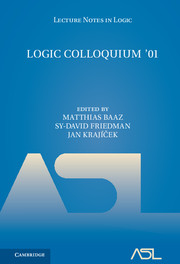Book contents
- Frontmatter
- Preface
- Contents
- TUTORIALS
- ARTICLES
- Modified bar recursion and classical dependent choice
- Choice and uniformity in weak applicative theories
- Compactness and incompactness phenomena in set theory
- Selection for Borel relations
- Interpolation in goal-directed proof systems 1
- Sequences of degrees associated with models of arithmetic
- The limit theory of generic polynomials
- Moschovakis's notion of meaning as applied to linguistics
- Tameness in expansions of the real field
- The model theory of compact complex spaces
- “Natural” representations and extensions of Gödel's second theorem 350
- Effective Hausdorff dimension
- Mutual stationarity in the coremodel
- The pair (Nn, N0) may fail N0-compactness
- Incompleteness theoremand its frontier
- Groups in Simple Theories
- References
Modified bar recursion and classical dependent choice
from ARTICLES
Published online by Cambridge University Press: 31 March 2017
- Frontmatter
- Preface
- Contents
- TUTORIALS
- ARTICLES
- Modified bar recursion and classical dependent choice
- Choice and uniformity in weak applicative theories
- Compactness and incompactness phenomena in set theory
- Selection for Borel relations
- Interpolation in goal-directed proof systems 1
- Sequences of degrees associated with models of arithmetic
- The limit theory of generic polynomials
- Moschovakis's notion of meaning as applied to linguistics
- Tameness in expansions of the real field
- The model theory of compact complex spaces
- “Natural” representations and extensions of Gödel's second theorem 350
- Effective Hausdorff dimension
- Mutual stationarity in the coremodel
- The pair (Nn, N0) may fail N0-compactness
- Incompleteness theoremand its frontier
- Groups in Simple Theories
- References
- Type
- Chapter
- Information
- Logic Colloquium '01 , pp. 89 - 107Publisher: Cambridge University PressPrint publication year: 2005
References
- 1
- Cited by



